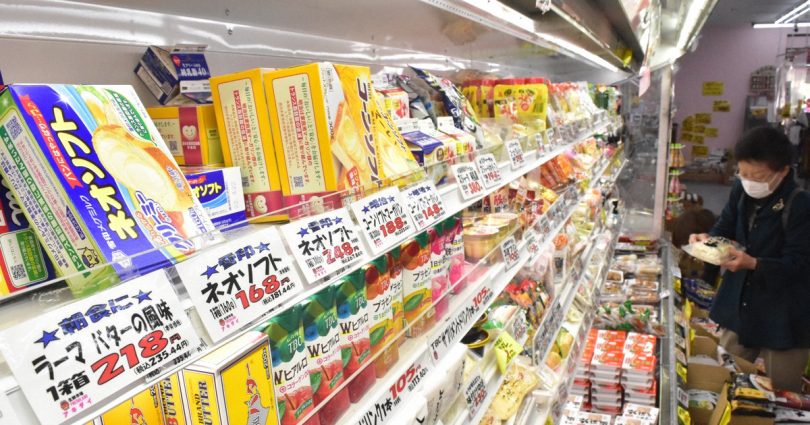[ad_1]

TOKYO (Kyodo) — Core consumer prices in Japan surged 2.2 percent in June, the fastest pace in over seven years, topping the Bank of Japan’s long-elusive 2 percent target for the third straight month, government data showed Friday, adding to the pain for price-sensitive households.
The nationwide core consumer price index, which strips away volatile fresh food items, marked its 10th straight month of year-on-year gain and underscores the sensitivity of resource-poor Japan to surging global energy prices. A weak yen has also played a big part in driving up prices of imported energy and raw materials.
The last time the headline inflation figure reached 2.2 percent was in March 2015, partly due to a consumption tax hike. Without the tax hike effect, June’s core CPI was the highest since September 2008, according to the Ministry of Internal Affairs and Communications.
The rise in core CPI comes after it gained 2.1 percent in both April and May, bolstering the case that inflationary pressure is persisting despite the BOJ’s view that the cost-push inflation is not sustainable and does not warrant a change in its ultralow rate policy.
Government subsidies to oil wholesalers to bring down gasoline and kerosene prices have helped limit the rise in core CPI at a time of surging energy prices driven by Russia’s war in Ukraine.
Kerosene prices jumped 23.4 percent from a year earlier, while gasoline jumped 12.2 percent, with the pace of increase for both energy sources slowing from the previous month. City gas was up 21.9 percent.
Japanese consumers have become increasingly aware of rising prices of everyday goods such as food. BOJ Governor Haruhiko Kuroda said Thursday after a policy meeting that wage growth has not kept pace with accelerating inflation, as he stressed the need to maintain monetary easing and support the economic recovery from the COVID-19 fallout.
Food prices, excluding those of perishables, rose 3.2 percent, the fastest pace since 2009. Higher raw material and energy costs affected a range of products from hamburgers and chocolate to bread, the data showed.
The year-on-year effect of sharply lower mobile data fees has been petering out in recent months, one of the reasons why Japan’s core CPI is above 2 percent. China’s lockdown steps in response to the COVID-19 pandemic and supply constraints also led to higher prices of durables such as air conditioners.
The so-called core-core CPI, excluding both energy and fresh food items, rose 1.0 percent, marking the third straight monthly gain.
[ad_2]
Source link








